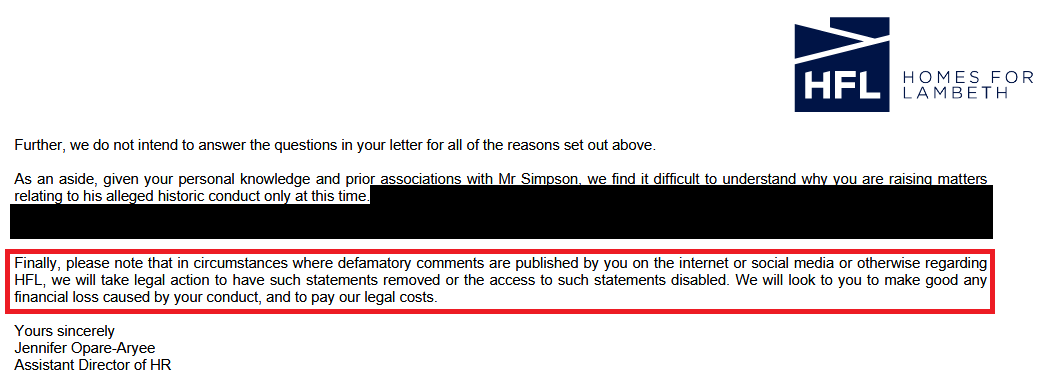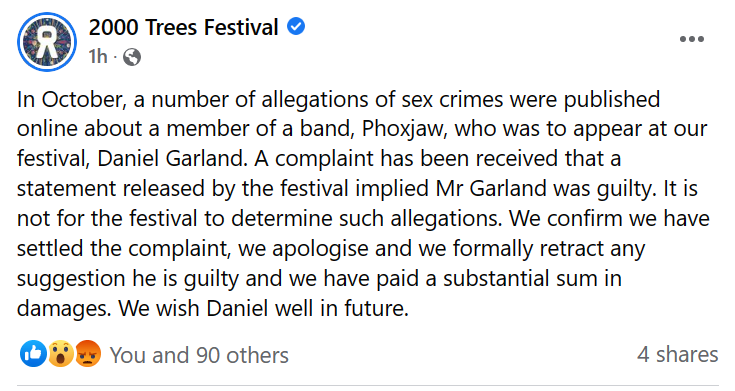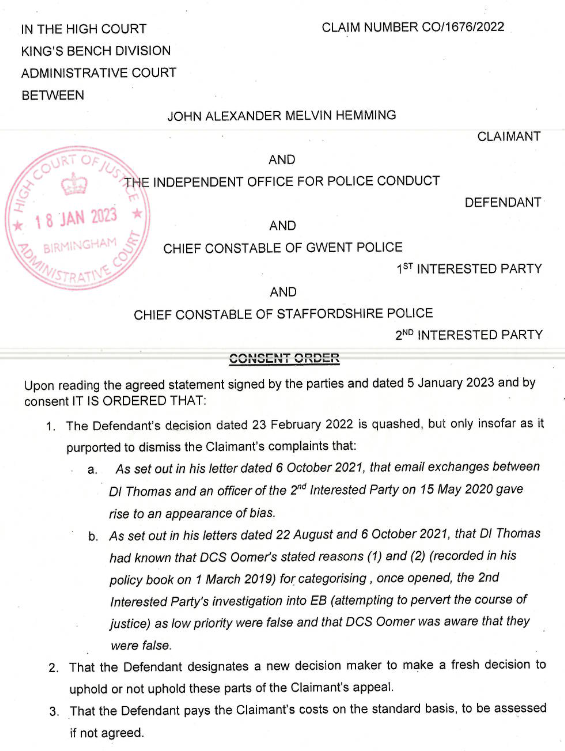Not so long ago your author sent a media inquiry to Lambeth council about a member of staff at the Homes for Lambeth project. Homes for Lambeth (‘HfL’) is a company owned by Lambeth Borough Council that was intended to produce social housing to meet the needs of that deprived area. According to an independent review by Lord Kerslake, commissioned by the Borough, it has failed spectacularly, only starting 65 homes in the five years since it was commenced. That is ‘started’ not ‘built’, let alone ‘occupied’. The Borough council has accepted the review and intends to wind up the company by April, bringing it in-house. HfL responded to the MHN inquiry via interim HR Director Jennifer Opare-Aryee making a literally impossible libel claim.

HfL threat of defamation on behalf of the body corporate. Can a private company scheduled for winding up suffer serious harm to its reputation, financially or otherwise, within the meaning of s1 Defamation Act 2013?
Before I write critical articles I send a media inquiry to affected parties inviting comment. Such inquiries, even if horribly mistaken, are usually privileged even if the resulting articles are not. In this case, contemplating an article about HfL staffer Paul Simpson I sent an inquiry to HfL. The precise matters of concern are not yet relevant. Sometimes there is a good explanation, and an inquiry is not followed by an article at all. In this case I may still have something to write in due course, but I am still in the process of verifying matters.
One point that was quite obvious from the response however, was an express threat that if I made defamatory comments regarding HfL itself, the body corporate, I would be sued for defamation – HfL would take legal action. This threat was wholly improper, for a very simple reason. No such claim could ever be properly advanced. Paul Simpson might well be able, at least theoretically, to claim against me for an actual or proposed article.
However, a proper claim in defamation by HfL as a body is literally impossible. To bring a claim in defamation, a claimant must show serious harm per s1 Defamation Act 2013. Further, “harm to the reputation of a body that trades for profit is not “serious harm” unless it has caused or is likely to cause the body serious financial loss”. Even if I made up something truly heinous and false, for example I accused some HfL executive of trying to reduce homelessness in Lambeth by secretly kidnapping babies born to poor parents in the Borough and making, ‘chicken’ McNuggets out of them to sell as street food, it is difficult to see how a company scheduled for abolition could allege serious harm, financial or otherwise. The imaginary executive could easily allege serious harm of course – I imagine proving the made-up Baby McNuggets claim would be a tall order – but the body corporate could not.
Furthermore, when HfL is brought in house, it still will not be able to sue as a body corporate because of the case of Derbyshire County Council v Times Newspapers Ltd [1993] 1 All ER 1011. Councils cannot sue in libel. Local authorities are also prohibited from indemnifying staff to bring libel claims. That is, if you work for a council, the council is allowed to pay your legal costs of defending a claim, but not bringing one per the The Local Authorities (Indemnities for Members and Officers) Order 2004. In the only case where a local government officer did this, it was the Chief Executive of Carmathenshire County Council, Mark James. This let to a police probe after the payments were ruled unlawful, although Mr James was not prosecuted.
Of course, Mark James was suing an impecunious and defenceless woman. This blogger went to law school and can and will successfully defend libel claims such as Esther Baker’s failed counter-claim in Smith v Baker. Your author obtained a distinction on his civil litigation exam and can write a defence or strike-out application and have it uploaded to the King’s Bench literally within hours, incurring no costs for the drafting at all.
So whilst Mr Simpson might in theory be able to bring a claim, he would be funding it himself, perhaps via a Trade Union or legal insurance. The council and HfL could neither fund him nor take action on their own behalf. One is prohibited by law, one is in the process of being shutdown and brought back in-house. Which leaves us with naked impropriety in relation to the threat to take action on behalf of HfL. It is a sinister and inept silencing attempt made by a woman who does not seem, from her LinkedIn profile, to be legally qualified. Given the response with the threat was meant to benefit HfL and Mr Simpson, it is difficult to see it being sent without Mr Simpson’s consent.
In light of the content of Ms Opare-Aryee’s letter, I have formed an adverse opinion and am left with grave reservations about Paul Simpson’s suitability and that of Jennifer Opare-Aryee for public service. It would be a concern if they were to remain with HfL when it is taken in house.
[An early draft of this article was put to the subjects Paul Simpson and Jennifer Opare-Aryee before publication. No denial was received, nor denial that Simpson approved of the letter. No request for an extension of time was received. No explanation of how I could cause serious harm to the reputation of a company being shut down by its owner for failure – let alone financial harm – was offered]
Edit 06/03/2024: In an attempt at rebranding, Paul is now going by Paul Hutchinson Simpson. Category added for clarity.
[Edited by MHN 20 November 2024 to remove information relating to third parties]







